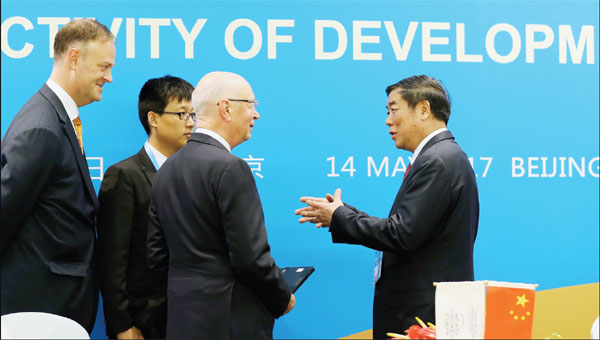Davos forum to take up Belt and Road
Discussions planned on best ways to leverage global market forces
The World Economic Forum will hold special discussions on how to implement the Belt and Road Initiative in the best ways to leverage global market forces.
The organization plans to include discussions on how to further strengthen cooperation and support the initiative in its annual meetings in Davos, Switzerland, and the annual meetings of the New Champions, also known as the Summer Davos Forum, says David Aikman, the group's chief representative officer for China.
"We'll help act as a catalyst to develop the initiative into a truly open, inclusive and forward-looking cooperation plat form that the region and the world need now," he says.
|
He Lifeng (right), head of the National Development and Reform Commission, speaks with Klaus Schwab (second right), founder and executive chairman of the World Economic Forum, at the Belt and Road Forum for International Cooperation in Beijing on May 14. Wang Zhuangfei / China Daily |
Although the initiative originated in China, it will benefit beyond its borders because the initiative is about mutual responsibility and shared results, Aikman says. Globalization efforts have experienced some difficulties, but the initiative has provided a new cooperation format, he adds.
Traditional frameworks of regional peace and cooperation are being torn apart by nationalist forces that blame external factors, such as refugees and terrorists, Klaus Schwab, founder and executive chairman of the economic forum, said on May 14.
The initiative can be a model for other regions to follow when dealing with such challenges, he said. Strong regional cooperation is a major building block for successful global cooperation, while people recognize that a purely market-driven global economy creates its own systemic challenges, such as a lack of inclusion and risk-resilience, Schwab said.
"New models of collaboration are needed that respect our multipolar world of overlapping national, regional and global identities, as well as priorities, while striving-as President Xi put it in Davos-to adapt and guide economic globalization, cushion its negative impact and deliver its benefits to all countries and nations," he said.
The initiative is an inclusive platform that covers the entire ancient overland and maritime Silk Roads, involving the countries connected by those routes and the international and regional organizations that wish to engage in cooperation, Schwab said.
The Summer Davos Forum will be held in June in Dalian, Liaoning province. Under the theme of Achieving Inclusive Growth in the Fourth Industrial Revolution, more than 2,000 participants from 90 countries are expected to take part in the meeting, the organization said.
cuijia@chinadaily.com.cn
At a glance
Participants at the Belt and Road Forum for International Cooperation agreed on May 15 to pursue such concrete measures as:
Cooperation
Pursuing dialogue and consultation, in order to build synergies in development strategies among participating countries.
Trade
Expanding trade by nurturing new areas of trade growth, promoting trade balance and promoting e-commerce and digital economy.
Deepening economic and trade cooperation and upholding the authority and effectiveness of the multilateral trading system.
Strengthening cooperation on information exchange for customs clearance and on developing mutual recognition of control, mutual assistance on enforcement and sharing of information.
Advancing global value chains development and supply chain connectivity.
Economy
Conducting in-depth consultation on macroeconomic issues by optimizing the existing multilateral and bilateral cooperation and dialogue mechanisms.
Infrastructure
Promoting practical cooperation on roads, railways, ports, maritime and inland water transportation, aviation, energy pipelines, electricity, fiber optics (including transoceanic cable), telecommunications and information and communication technology, and putting in place an international infrastructure network.
Maximizing synergies in infrastructure planning and development by taking into account international standards where applicable, and by aiming at harmonizing rules and technological standards when necessary.
Science and technology
Strengthening cooperation in innovation by supporting innovation action plans for e-commerce, digital economy, smart cities and science and technology parks.
Finance
Jointly working on a long-term, stable and sustainable financing system and enhancing financial infrastructure connectivity by exploring new models and platforms for investment and financing and improving financial services.
Promoting openness and connectivity among financial markets, including through mutual cooperation on payment systems and promotion of financial inclusion, and promoting bilateral local currency settlement and cooperation agreements.
Environment
Enhancing cooperation in ensuring the protection of the environment, biodiversity and natural resources.
People-to-people
Promoting people-to-people exchanges and bonds by deepening practical cooperation on education, science, technology, sports, health, think tanks, media and capability-building through internships.
Encouraging dialogues and cultural exchanges, promoting tourism and protecting the world's cultural and natural heritage.



















